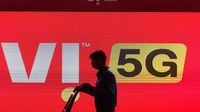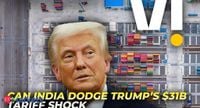In a significant development that could reshape the Indian telecom landscape, the government has agreed to increase its stake in Vodafone Idea from 22.60% to 48.99% by converting outstanding spectrum auction dues into equity. This move, amounting to ₹36,950 crore, comes at a time when the company is grappling with severe financial challenges and faces a $31 billion export loss due to impending U.S. tariffs.
As of April 1, 2025, Vodafone Idea’s shares are locked in the upper circuit on the National Stock Exchange (NSE) at ₹7.49, reflecting a rise of 10%. This surge in stock price follows the government’s decision to allow the conversion of outstanding dues, including deferred payments, into equity shares. Vodafone Idea has been directed to issue 3,695 crore equity shares at an issue price of ₹10 each within 30 days.
The context surrounding this decision is critical. The U.S. plans to implement reciprocal tariffs starting April 2, which could further strain India's export economy, particularly in the telecom sector. Industry experts are concerned that these tariffs may exacerbate the financial woes of companies like Vodafone Idea, which are already struggling to compete against giants such as Bharti Airtel and Reliance Jio.
Subhendu Pattnaik, Chief Marketing Officer at Covasant, highlighted the urgency of the government’s intervention, stating, "Right now, there’s just Bharti Airtel and Reliance Jio, nobody else. Vi is important to prevent a duopoly in the market. So the decision to try and keep the company afloat is a welcome choice." This sentiment echoes the broader concerns within the industry regarding the sustainability of competition in the telecom market.
However, the government's decision has raised questions about its long-term strategy for Vodafone Idea. Analysts point out that while the increased stake may provide temporary relief, it does not guarantee the company’s survival or its ability to compete effectively in the future.
Shriram Subramanian, Founder and Managing Director of InGovern Research Services, noted, "The market price of ₹6 would have led to government shares increasing to 55-60% stakes from 22.60%. The government already has BSNL [Bharat Sanchar Nigam Ltd], and Vi is still making operating profits. They’re trying to keep the company afloat without making it a PSU and keep competition alive." This underscores the delicate balance the government is attempting to strike between supporting Vodafone Idea and preventing excessive control over the telecom market.
Despite the immediate positive reaction in the stock market, concerns linger about the viability of Vodafone Idea. A report from JM Financial expressed skepticism about the government’s approach, stating, "The Centre’s decision to increase its stake raises serious questions about the government’s long-term vision for the cash-strapped telecom operator. While this move may provide temporary relief, it does not ensure Vodafone Idea’s survival, let alone enable it to compete effectively with Reliance Jio and Airtel."
As the situation develops, industry stakeholders are keenly observing how the government plans to navigate the complexities of the telecom sector. With the looming threat of U.S. tariffs and the potential for a trade war, the stakes are high. The Indian government must articulate a clear roadmap for the future of Vodafone Idea, particularly if it hopes to ensure the company’s longevity in a fiercely competitive environment.
In the broader context, the trade implications of the U.S. tariffs cannot be understated. The impending tariffs, which are set to take effect soon, could significantly impact India’s export economy, particularly in sectors reliant on telecommunications. As companies brace for these changes, the government's actions regarding Vodafone Idea may serve as a bellwether for its overall strategy in the face of international trade pressures.
In conclusion, the Indian government’s decision to bolster its stake in Vodafone Idea reflects a strategic attempt to stabilize a key player in the telecom market amid growing economic pressures. However, the long-term effectiveness of this strategy remains to be seen, especially in light of external challenges such as U.S. tariffs and the dominance of established competitors.





